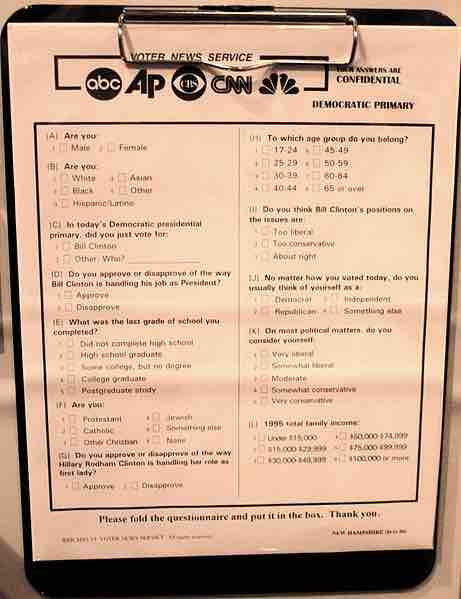Public opinion or Political opinion is the aggregate of individual attitudes or beliefs held by the adult population. Public opinion can also be defined as the complex collection of opinions of many different people and the sum of all their views.
Since the 1950s, television has been the main medium for molding public opinion. Public opinion as a concept gained credence with the rise of "public" in the eighteenth century. The English term "public opinion" dates back to the eighteenth century and has derived from the French "l'opinion", which was first used in 1588 by Montaigne. This concept came about through the process of urbanization and other political and social forces. For the first time, it became important what people thought, as forms of political contention changed.
Adam Smith (1723-1790), one of the earliest classical economists, refers to public opinion in his Theory of Moral Sentiments. But it was Jeremy Bentham (1748-1832), the famous utilitarian Philosopher, who fully developed theories of public opinion. He opined that public opinion had the power to ensure that rulers would rule for the greatest happiness of the greater number. He brought in Utilitarian philosophy in order to define theories of public opinion. The German sociologist Ferdinand Tönnies, by using the conceptional tools of his theory of Gemeinschaft and Gesellschaft, argued (1922, "Kritik der öffentlichen Meinung"), that 'public opinion' has the equivalent social function in societies (Gesellschaften) which religion has in communities (Gemeinschaften) - election of opinions of many different people and the sum of all their views.
German social theorist, Jürgen Habermas (born in 1929), contributed the idea of "Public Sphere" to the discussion of public opinion. The Public Sphere, or bourgeois public is, according to Habermas, where "something approaching public opinion can be formed" (2004, p. 351). Habermas claimed that the Public Sphere featured universal access, rational debate, and disregard for rank. However, he believes that these three features for how public opinion are best formed are no longer in place in western liberal democratic countries. Public opinion, in western democracy, is highly susceptible to elite manipulation.
The American sociologist Herbert Blumer (1900 - 1987) has proposed an altogether different conception of the "public. " According to Blumer, public opinion is discussed as a form of collective behavior (another specialized term) which is made up of those who are discussing a given public issue at any one time. Given this definition, there are many publics; each of them comes into being when an issue arises and ceases to exist when the issue is resolved. Blumer claims that people participate in public in different capacities and to different degrees. So, public opinion polling cannot measure the public. An educated individual's participation is more important than that of a drunk. The "mass," in which people independently make decisions about, for example, which brand of toothpaste to buy, is a form of collective behavior different from the public.
Public opinion plays an important role in the political sphere. Cutting across all aspects of relationship between government and public opinion are studies of voting behavior. These have registered the distribution of opinions on a wide variety of issues, have explored the impact of special interest groups on election outcomes and have contributed to our knowledge about the effects of government propaganda and policy. More often than not, leaders use public opinion to weight their options when instituting new policies, since public opinion represents the popular views of citizens on the proper role of government. However, public opinion can be subject to elite manipulation. Thus, public opinion cannot be the sole determinant factors for informing the people on important issues of the day.
The rapid spread of public opinion measurement around the world is a reflection of the number of uses to which it can be put. Public opinion can be accurately obtained through a random sample survey, if done correctly. Governments have increasingly found surveys to be useful tools for guiding their public policies through voter polls as seen in . The US Department of Agriculture was one of the first government agencies to sponsor systematic and large scale surveys. It was followed by many other federal bodies, including the US information agency which has conducted opinion research in all parts of the world. Public opinion can be influenced by public relations and the political media. Additionally, mass media utilizes a wide variety of advertising techniques to get their message out and change the minds of people.The tide of public opinion becomes more and more crucial during political elections, most importantly elections determining the national executive.

Voter Poll
Voter polling questionnaire on display at the Smithsonian Institution